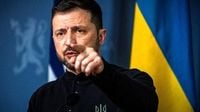Ukrainian President Volodymyr Zelenskyy is heading to New York next week, and the stakes could hardly be higher. With the war in Ukraine grinding on and Russian attacks intensifying, Zelenskyy’s meeting with U.S. President Donald Trump at the United Nations has become a focal point for both diplomatic maneuvering and urgent pleas for action. According to The Guardian and Rokna, Zelenskyy’s message is clear and unambiguous: the world, and especially the United States, cannot afford to keep "wasting time" in the face of Russian aggression.
Speaking to journalists in Kyiv just days before his departure, Zelenskyy didn’t mince words about his frustration. "If the war continues and there are no moves towards peace, we expect sanctions," he declared, reiterating his expectation that further measures against Russia are inevitable unless President Vladimir Putin agrees to direct talks or a ceasefire. The Ukrainian leader’s sense of urgency is palpable, and it’s not hard to see why.
Despite repeated threats of action from the White House, Trump has so far held back on imposing major new sanctions on Russia. Last week, he told reporters that the United States was prepared to take decisive steps—but only after all NATO countries agreed to stop buying Russian oil and imposed tariffs on China, a move that would require rare unity among America’s allies. Zelenskyy, for his part, is unimpressed by this approach. As he told The Guardian, "President Trump expects strong action from Europe. I think we are wasting a lot of time if sanctions are not imposed or some steps are not taken, that we very much expect from him."
The transatlantic stalemate is complicated further by resistance from within Europe itself. Hungary and Slovakia, both considered close allies of Trump within the European Union, have steadfastly refused to cut their energy ties with Moscow. In fact, Hungary and Slovakia are now the last two EU members still importing Russian oil via the Druzhba pipeline—a lifeline that Ukraine recently targeted in an effort to disrupt Russian revenues, sparking a furious response from Hungarian Prime Minister Viktor Orbán.
Zelenskyy is adamant that only a united European front will have the necessary impact on Moscow. "The whole of Europe" must act, he insists, and he believes Trump could wield considerable influence in persuading reluctant countries like Slovakia to get on board. "Everyone is looking to the United States," he noted, highlighting the unique leverage Washington holds.
Diplomatic efforts are ongoing, but the road to peace remains fraught with obstacles. Zelenskyy has repeatedly expressed his willingness to meet Putin in any format—whether one-on-one or in a trilateral setting with the U.S. president present. The Kremlin, however, maintains that the "root causes" of the conflict must be addressed before any such meeting can take place, a stance widely interpreted as a demand for Ukrainian concessions.
As part of his New York agenda, Zelenskyy will also seek clarity on what security guarantees the U.S. is prepared to offer as part of any potential peace settlement. This question was previously raised by British Prime Minister Keir Starmer during Trump’s state visit to the United Kingdom, underscoring the international dimensions of Ukraine’s security concerns.
There’s also a deeply personal element to the upcoming trip. Zelenskyy revealed that his wife, Olena, will "most likely" meet with U.S. First Lady Melania Trump in New York to discuss the return of Ukrainian children kidnapped by Russian forces. Observers note that Melania is widely viewed as more sympathetic to Kyiv’s plight than the president himself, who reportedly criticized Zelenskyy during their February Oval Office meeting. Their most recent encounter at the White House in August, which included several European leaders, was reportedly more positive.
The urgency of Zelenskyy’s appeal is underscored by recent events on the ground. On Friday, three Russian fighter jets violated Estonian airspace, a provocative move that sent ripples of concern across Europe. Meanwhile, Ukraine is ramping up its use of long-range drones to strike at Russian energy infrastructure. On Saturday, drones hit the Saratov oil refinery for the second time in a week, with dramatic footage showing explosions and flames lighting up the night sky. Another refinery in Samara oblast was also damaged in the attacks.
The impact of these strikes is already being felt inside Russia, where a growing fuel crisis has led to long queues at gas stations. Zelenskyy predicted that the situation will only worsen, noting that Ukraine is rapidly closing the gap with Russia in drone production—but additional funding is sorely needed to sustain domestic weapons manufacturing.
But the violence is far from one-sided. Overnight before September 20, Russia launched a large-scale drone and missile assault on Ukraine, targeting multiple regions including Dnipro, Mykolaiv, Chernihiv, and Zaporizhzhia. The attack on Dnipro was particularly deadly: at least three people were killed when a missile carrying cluster munitions struck an apartment building. According to Rokna, Zelenskyy condemned what he described as a "deliberate strategy" by the Kremlin to terrorize civilians and destroy infrastructure, rather than focusing on military targets.
In a post on social media, Zelenskyy called for "a strong international response," urging European countries to bolster Ukraine’s air defenses and step up weapons supplies. He warned that without such support, Russia’s campaign of terror would only intensify, with devastating consequences for ordinary Ukrainians.
Underlying all these developments is a growing sense of impatience and frustration—not just in Kyiv, but among Ukraine’s supporters across the globe. The war has now dragged on for years, with no clear end in sight and the humanitarian toll mounting by the day. As Zelenskyy prepares to make his case in New York, the world will be watching closely to see whether his pleas for action are finally heeded—or whether, as he fears, more precious time will be lost to indecision and delay.
In the end, the question remains: will the international community step up to meet the moment, or will history look back on this period as one of missed opportunities and avoidable tragedy? For Ukraine, the answer could prove decisive.

